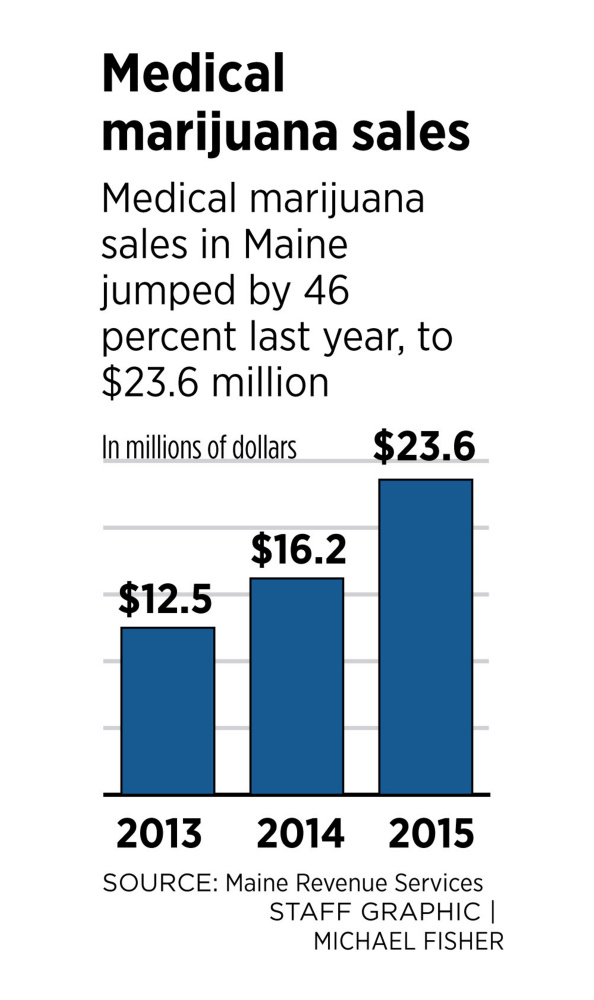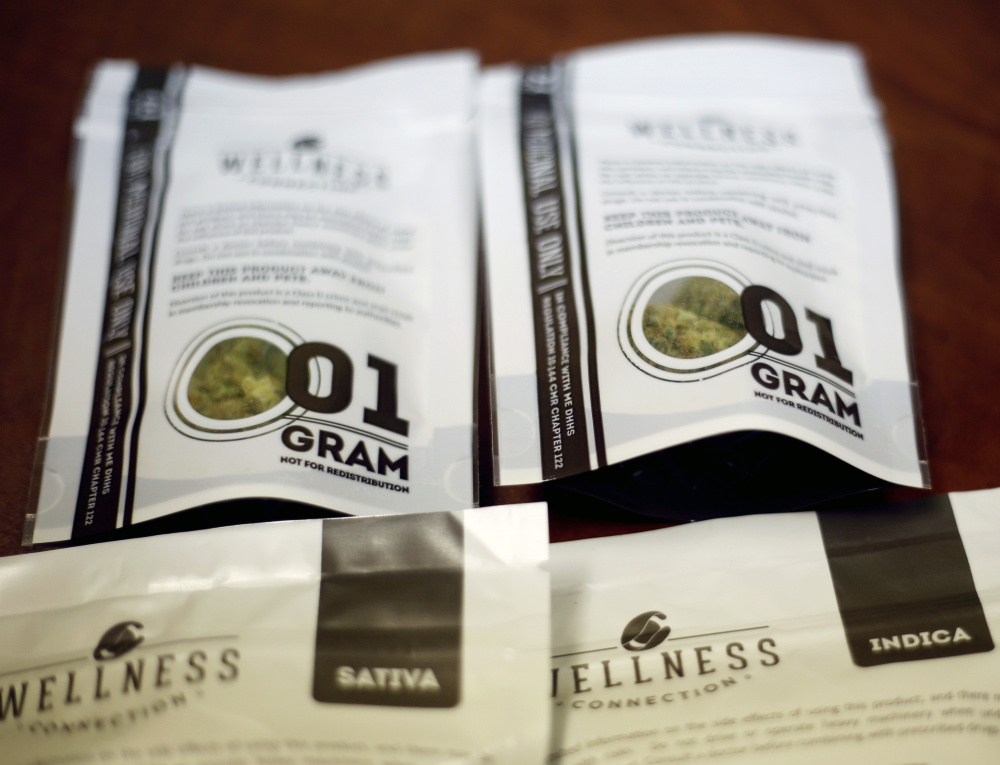Mainers spent $23.6 million on medical marijuana from dispensaries last year, a 46 percent increase driven by multiple factors, including patients seeking alternatives to prescription painkillers and more doctors certifying people to use the drug, according to dispensary operators.
Operators say the increase in sales illustrates the growing willingness of patients and doctors to consider alternatives to traditional medicine, and a reduction in the social stigma surrounding the use of medical marijuana.
But an official for the Maine Medical Association said Wednesday the big jump also shows why the medical community has resisted opening the program to more patients with different medical conditions, citing a lack of research that demonstrates medical marijuana is effective in treating them.
The $23.6 million in 2015 dispensary sales generated $1.29 million in sales tax, according to Maine Revenue Services. In 2014, the dispensaries sold $16.2 million worth of medical marijuana products and collected more than $892,000 in sales tax, a 40 percent increase over the previous year and more than triple the tax revenue collected in 2013.
The sales figures from Maine Revenue Services do not include numbers from the state’s 2,255 caregivers, who are small-scale growers authorized to sell marijuana to up to five patients.
“There are a number of factors at play here. The first would be that Mainers are becoming more used to the idea of therapeutic cannabis,” said Becky DeKeuster, director of education for Wellness Connection, which operates four of Maine’s eight dispensaries. “We’ve had a very successful dispensary program for five years now and people are becoming used to this option.”
340 PROVIDERS CERTIFY PATIENTS
Maine is one of 34 states that allow some form of medical cannabis. Maine legalized medical uses in 1999, and the state’s first dispensaries opened in 2011. Last year, Maine’s program was voted the best medical marijuana program in the country by Americans for Safe Access, a national group that advocates for legal access to the drug.
The state cannot provide an exact number of patients because it does not keep a registry, but doctors have printed more than 35,000 certificates required under state regulations to certify patients. That number could include duplicates and replacement certificates and is likely higher than the actual number of patients, said Samantha Edwards, spokeswoman for the state Department of Health and Human Services, which oversees the medical marijuana program.
About 340 medical providers certified patients to obtain medical marijuana. Patients qualify for certification if they have one of a dozen specific conditions, including cancer, glaucoma, chronic pain and Crohn’s disease.
Tim Smale, operator of the Remedy Compassion Center in Auburn and president of the Maine Dispensary Operators Association, believes there has been about a three-fold increase in the number of doctors certifying patients in the past couple of years. Maine law has been amended so that nurse practitioners and physician’s assistants also can certify patients.
“In previous years there just didn’t seem to be as many doctors writing certifications,” Smale said.
The DHHS could not immediately provide data Wednesday on the types of medical providers writing certifications and how that number has changed over time.
Gordon Smith, spokesman for the state medical association, said the large increase in sales illustrates why the association has lobbied against efforts to expand the medical marijuana program to include more qualifying conditions or eliminate them altogether.
“We don’t want to put Maine’s medical community in a position where it’s being asked to be a front for recreational use of marijuana,” Smith said. “We acknowledge marijuana helps a small number of medical conditions and there is good evidence of that, but for many of the (conditions) on the list, there’s not scientific data to establish marijuana is helpful.”
VALUE FOR TREATING PTSD DEBATED
One condition that has been debated is post-traumatic stress disorder, which Maine added to the list of qualifying conditions in 2013.
The Mayo Clinic defines post-traumatic stress disorder as a mental health condition that’s brought on when a person sees or experiences a severely traumatic event. A person suffering from PTSD may have uncontrollable thoughts about the event and also experience flashbacks, nightmares and severe anxiety.
Although several other states have authorized medical marijuana sales to people with PTSD, the U.S. Department of Veterans Affairs describes the practice as a growing concern because some veterans are using the drug to relieve symptoms of PTSD, yet there is a lack of medical evidence of its effectiveness.
DeKeuster said Wellness Connection, which serves about 11,000 patients across the state, is seeing more patients who want to use medical cannabis as a first option for treatment instead of as a last resort. The top three qualifying conditions among Wellness Connection patients are chronic pain, post-traumatic stress disorder and cancer.
“Physicians and patients both are looking for a pain relief solution that is natural,” DeKeuster said.
INCREASE IN ELDERLY PATIENTS
Another factor contributing to the rise in the use of medical marijuana is that dispensaries have dozens of strains, as well as pills, tinctures and edible forms that make taking the drug easier, DeKeuster said.
Smale said dispensary operators across the state report similar trends among all their patients, including seeing more elderly people who want to use medical cannabis for treatment of chronic pain. The Remedy Compassion Center, which Smale owns and operates in Auburn, now primarily serves patients between ages 50 and 70, he said.
“The other things we’re finding is folks are looking for an alternative to their opiates,” he said. “We hear many anecdotal reports of people reducing or eliminating opiate use through medical cannabis.”
Send questions/comments to the editors.





Comments are no longer available on this story